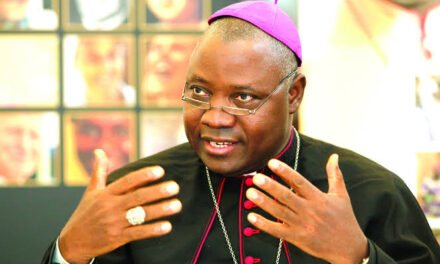Catholic Bishops in Africa have identified violent conflicts on the continent as a challenge that requires spiritual solidarity. To this end, they have unanimously implored the Holy Spirit to Grant Africa’s Leaders “intelligence, discernment, wisdom, fear of God”. It is a known fact that the singular problem dragging our African continent behind is that of poor leadership. This ill goes from the West, East, South, North, and Central Africa. All the countries in this continent have their own quota of poverty in leadership and this has left the country ever on the underdeveloped level over the years.
In their Message on the Solemnity of Pentecost 2024, shared with ACI Africa and made available to the Accra Ghana Correspondent of RECOWACERAO NEWS AGENCY, RECONA on Monday, May 20, members of the Symposium of Episcopal Conferences of Africa and Madagascar (SECAM) have unanimously urged the people of God in Africa to pray for leaders on the continent to be granted the various gifts of the Holy Spirit.
“Working for peace in Africa and throughout the world is one of the challenges we face today,” Catholic Bishops in Africa say, and describe the peace on the continent as “so fragile” amid violent conflicts.
They appeal for spiritual solidarity, saying, “We need to pray unceasingly for peace while imploring the Holy Spirit to grant African leaders the spirit of intelligence (discernment), wisdom, and the fear of God.”
The highlighted gifts of the Holy Spirit “are important if they are to maintain peace on a continent plagued by political conflict and civil war, with their trail of death and displaced people,” SECAM members explain in their three-page Pentecost Message that their President, Fridolin Cardinal Ambongo of the Democratic Republic of Congo (DRC), signed.
“We are well aware that these wars are linked to the exploitation of natural and mining resources, resulting in permanent insecurity for the populations, given that these resources are geopolitical stakes for foreign countries, including the great powers,” Catholic Bishops in Africa say, alluding to previous lamentations about land grabbing, expropriation, and exploitation in Africa.
Despite this “gloomy picture”, SECAM members say, “glimmers of hope are appearing thanks to the initiatives taken by the Bishops of Africa to maintain and restore peace in certain regions of Africa.”
In their message dated May 19, Pentecost Sunday, Catholic Bishops in Africa laud the initiatives that members of the Reunion of Episcopal Conferences of West Africa (RECOWA) undertook “to dissuade ECOWAS (The Economic Community of West African States) leaders from using force to restore constitutional order in Niger, in order to avoid bloodshed and forced displacement of populations.”
Another initiative that Catholic Bishops in Africa say “will go down in history” as significant is that of the Association of Episcopal Conferences of Central Africa (ACEAC), which they say, “organized a giant mass for peace for the bishops of the Great Lakes region in Goma on January 28 of this year.”
“Such initiatives are commendable, and deserve to be supported both by our prayer and by our commitment to justice and peace,” SECAM members say, and add, “As Christians, we are called to become peacemakers and sow the seeds of hope for a better future in Africa.”
Reflecting on the events of Pentecost Sunday that celebrate the descent of the Holy Spirit upon the Apostle, who was enabled to speak in multiple languages with mutual understanding, SECAM members say, “The gathering in this symbolic place steeped in history can be seen as globalization.”
“Despite the multiplicity of languages, people manage to make themselves understood, and the extraordinary thing is that they hear the word of God in their own languages. And today we rejoice in this miracle of tongues, as Christian rites and the Eucharistic liturgy are celebrated in vernacular languages,” they say.
SECAM members caution, “While it’s fair to say that the spread of Christianity has brought peoples together to such an extent that it appears to be a forerunner of globalization, there’s nothing to suggest that Christianity, as we live it in the Catholic Church, is in harmony with globalization, which has conveyed a single way of thinking while promoting a lifestyle focused on the satisfaction of essentially material and economic needs. «They, however, SECAM members say, “not everything about globalization is negative. We need only cite the example of the Internet and information and communication technologies, thanks to which peoples are interconnected and the bonds of solidarity between nations strengthened.”
They note that the “challenge we face today, and which emerges from development issues in these difficult times, is to show that ethics should be taken into consideration in commercial relations.”
“From now on, we need to give direction to economic activities by insisting on the common good, justice, and the values handed down by our cultures in Africa, such as the family, solidarity, mutual aid, fraternity, and the defense of life,” Catholic Bishops in Africa say.
They note that “in so doing, we allow ourselves to be guided by the Holy Spirit, who enlightens us with gifts such as discernment, wisdom and the fear of God, while purifying our cultures so that they help us to live Pentecost, while listening to the Word of God and journeying with our Christian brothers and sisters around the world, with a view to live synodality in the Church.”
“Let us imbue ourselves with this hope that was breathed into us by the Holy Spirit at Pentecost, for “hope does not disappoint, since the love of God has been poured into our hearts by the Holy Spirit who has been given to us,” SECAM members say in their Pentecost 2024 Message.
- RECOWA-CERAO WELCOMES TWO NEW BISHOPS - July 26, 2024
- TODAY WE ARE TAKING UP THE THIRD SEGMENT IN OUR SERIES - July 26, 2024
- CHARACTERISTICS OF GREAT LEADERS SHARED BY A USA AUTHOR - July 25, 2024







